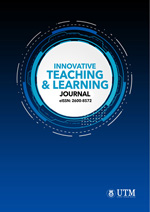Examining Students’ Intentions to use Digital Tools: A Theory of Planned Behaviour
DOI:
https://doi.org/10.11113/itlj.v9.184Keywords:
Digital tools, Students’ intention, Ethical behavior, Academic integrity, Theory of Planned BehaviorAbstract
The use of digital tools in education has significantly increased since the COVID-19 pandemic began. Digital tools like ChatGPT, Plagiarism Checker, and Citation tools are increasingly becoming students’ most-used tools to complete their assignments. Although these tools contribute substantially to increasing productivity and understanding the process of assignment, they also raise concerns for educators and the education system regarding students’ academic integrity, particularly in terms of plagiarism or any other form of academic dishonesty. The study aims to examine how students’ attitudes towards digital tools, subjective norms, and perceived behavioural control influence students’ intentions concerning the use of digital tools in completing assignments. Based on the Theory of Planned Behaviour (TPB), this study will investigate the effects of these factors on students’ intention to use digital tools responsibly and align with academic integrity standards. The study employed a purposive sampling method to specifically target 450 undergraduate accounting students from Universiti Malaysia Terengganu, in which, 85 students were fully completed the survey, using a structured questionnaire through Google Forms link. The data was analysed using IBM SPSS version 26.0. The finding reveals that despite high perceived and frequent use of digital tools, only subjective norms significantly predicted students’ intention to use these tools. Attitude and perceived behavioural control were not statistically significant predictors of the students’ intentions, indicating that social influences were more dominant than individual factors. This study emphasizes the influence of perceived social expectation and aligns with the TPB in the academic context. Higher institutions aiming to promote responsible digital use should focus on educating positive peer culture and reinforcing academic expectations.

















